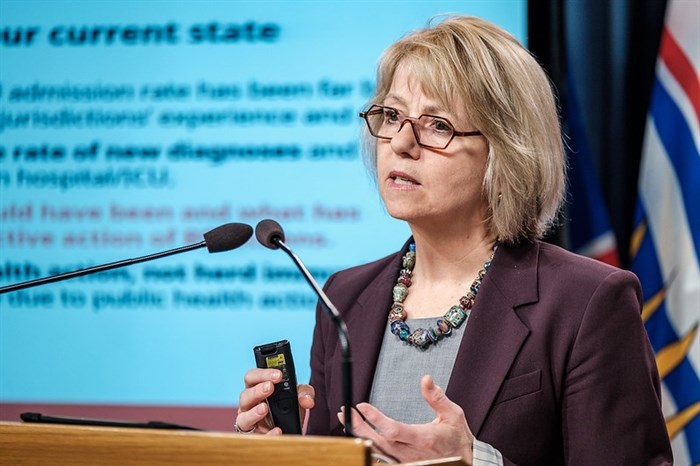
FILE PHOTO - B.C.’s provincial health officer Dr. Bonnie Henry provide an update on COVID-19 on April 17, 2020.
Image Credit: SUBMITTED / Province of B.C.
June 29, 2021 - 6:00 PM
B.C.'s top doctor is confident that this province's COVID-19 death toll is in line with what's already been reported, despite claims the number of pandemic deaths was largely underreported across the country.
The report by the Royal Society of Canada titled Excess All-Cause Mortality During the COVID-19 Epidemic in Canada says among other things that there’s evidence that at least two-thirds of the deaths caused by COVID-19 in communities outside of the long-term care sector may have been missed.
“I think we need to take that review with a grain of salt because as we've presented a number of times, we have an ongoing surveillance system where we do look at total deaths and deaths by cause here in British Columbia,” provincial health officer Dr. Bonnie Henry said.
“Very early on in this pandemic we had an arrangement with the Coroner's Service — we work together to make sure that any sudden unexpected deaths in the community were tested for COVID — so I don't agree with what that report has come out with.”
The report, Dr. Henry said, relies on assumptions between what happened in Ontario, for example, and what happened in B.C.
“Undoubtedly, there are some deaths that we missed early on,” she said.
“It's just a function of the testing capacity, but we also know from the work that we have done — this surveillance that we've had over the last 10 years that we continued through this pandemic — that the vast majority of deaths that we saw were related to COVID in older age groups and related to the overdose crisis in younger age groups.”
She said some of this data has been presented on in the past and there are always unexpected deaths in the community that are related.
From data pulled from the B.C. CDC, Dr. Henry said many of these unexpected deaths were people not seeking health services for other underlying conditions when they needed to, so not directly related to COVID.
“We’ve seen that in the Emergency Department data we've seen that in hospitalization data through that period of time,” she said. “So this is absolutely something that we are continuing to monitor and change and to try and understand.”
The study found that between Feb. 1 and Nov. 28, 2020, the COVID-19 deaths of approximately 6,000 people aged 45 and older living in communities across Canada appear to have gone undetected, unreported or unattributed to COVID-19.
"This suggests that if Canada has continued to miss these fatalities at the same rate since last November, the pandemic mortality burden may be two times higher than reported. Our conclusion is based on an examination of the best available reports of excess deaths across Canada, the pattern of COVID-19 fatalities during the pandemic, cremation data showing a significant spike in at-home versus hospital deaths in 2020 and antibody surveillance testing that collectively unmasked the likely broad scope of undetected COVID-19 infections."
The report's authors say the extent of likely missed COVID-19 fatalities in communities varies by province, and was, for example, less of an issue in Québec, where the virus accounted for all excess deaths. Yet when factored into the national equation, the number of possible missed deaths in the country’s communities suggests that COVID-19 fatalities in long-term care actually account for 45 percent of Canada’s total COVID-19 death toll, a figure more in line with the OECD average.
"While this is roughly half the proportion assumed, it stands to reason: If Canada indeed had twice as many COVID-19 long-term care deaths as other OECD countries, the mortality and case fatality rates in Canada’s long-term care sector should also have been as twice as high as the OECD average — but they were not," the authors state.
The society calls for prioritization of people and populations for interventions to prevent COVID-19 deaths among people living with clinical frailty, their household members and neighbours in congregate living settings, and formal and informal caregivers who enter the homes of frail individuals to give support.
They say it should also be given to people living in high-priority neighbourhoods bearing the largest burden of COVID-19 exposure and death due to structural economic, social, and racial inequities. These include low-income and racialized essential frontline workers, recent immigrants, people living in high-density housing and multigenerational households.
To that, Dr. Henry conceded more work has to and will be done. She also said health officials have a good understanding of how the pandemic has affected Indigenous peoples in B.C. but it doesn’t have a case-by-case data by race.
“We are absolutely working with our colleagues across the country to find other ways of understanding the impact on different communities because as you can imagine, when somebody has been diagnosed, particularly early on with a new infectious disease, some of those questions are not that important in terms of us understanding how to react to the pandemic,” she said.
“They are absolutely important in helping to understand the inequities and the impacts on communities. And we have other ways of finding that information including things like the surveys that we have done.”
To contact a reporter for this story, email Kathy Michaels or call 250-718-0428 or email the editor. You can also submit photos, videos or news tips to the newsroom and be entered to win a monthly prize draw.
We welcome your comments and opinions on our stories but play nice. We won't censor or delete comments unless they contain off-topic statements or links, unnecessary vulgarity, false facts, spam or obviously fake profiles. If you have any concerns about what you see in comments, email the editor in the link above.
News from © iNFOnews, 2021